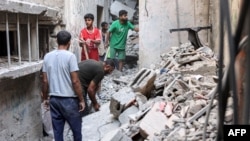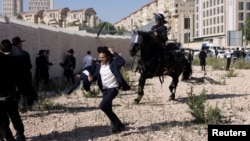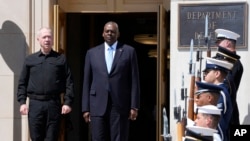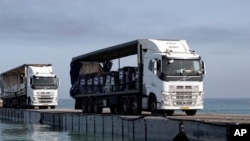Local officials and family members said an Israeli airstrike Tuesday in northern Gaza killed 10 relatives of Hamas political chief Ismail Haniyeh, who is based in Qatar.
The strike hit a house in the Shati refugee camp west of Gaza City.
Israeli strikes earlier in the war killed three of Haniyeh’s sons.
Israel’s military said its forces carried out airstrikes targeting buildings in Shati and another area in northern Gaza that it said were being used by Hamas militants who were involved in the October 7 attack on Israel.
The latest fighting came as Israel’s Supreme Court ruled that the military must draft ultra-Orthodox Jewish seminary students.
The unanimous decision Tuesday could put additional pressure on Prime Minister Benjamin Netanyahu’s government, which relies on two ultra-Orthodox parties in its coalition.
The war in Gaza and Israel’s clashes with Hezbollah militants along the border with Lebanon have made the issue even more prominent as people question the long-standing exemptions that allow the seminary students to avoid the military service required of most Israeli men and women.
In Washington, U.S. Defense Secretary Lloyd Austin warned his Israeli counterpart, Yoav Gallant, that a heightened conflict between Israel and Hezbollah could touch off a regional war and urged a diplomatic solution.
Even as the Israel-Hamas conflict has extended into a ninth month of fighting, Israeli forces have exchanged fire with Lebanon's Iran-backed Hezbollah on a near-daily basis.
"Another war between Israel and Hezbollah could easily become a regional war, with terrible consequences for the Middle East," Austin said. "Diplomacy is by far the best way to prevent more escalation."
Gallant, speaking before talks with Austin, said, “We are working closely together to achieve an agreement, but we must also discuss readiness on every possible scenario.” Israel’s army said last week that it has plans "approved and validated" for fighting Hezbollah.
Secretary of State Antony Blinken also urged Israel to avoid escalation in Lebanon when he met with Gallant on Monday. Israel and Hezbollah last fought a full-scale war in 2006 when a cross-border Hezbollah attack sparked 34 days of fighting that took a heavy toll on Lebanon, especially the country's southern region.
The Israeli defense leader also met with CIA chief Bill Burns, the key U.S. official in negotiations to free hostages held by Hamas, which launched the unprecedented attack on Israel in October that triggered Israel’s counteroffensive in Gaza.
Netanyahu has said Israeli forces are winding up the most intense part of the Gaza war and will redeploy to the northern border, although he has cast the move as defensive.
Blinken also pressed Gallant to take more steps to protect aid workers in Gaza.
Earlier Monday, European Union foreign policy chief Josep Borrell told reporters in Luxembourg that the risk of the Gaza war spilling over into Lebanon is growing bigger every day.
"I think that, unhappily, we are on the eve of the war expanding," Borrell said.
He also said a cease-fire in Gaza is desperately needed to facilitate the flow of humanitarian aid, saying, "Delivery of humanitarian assistance inside Gaza has become impossible."
A temporary pier that was built for delivering aid into Gaza via a sea route paused deliveries Monday due to "scheduled maintenance," Pentagon press secretary Major General Pat Ryder told reporters.
Sunday marked the U.S.-built pier's largest delivery day to date, moving 720 metric tons of aid to the Gaza beach that day. Since operations began on May 17, the U.S. military has delivered more than 6,200 metric tons of aid via the sea route to the Gazan coast destined for Palestinians, according to Ryder.
However, aid organizations say corridors intended to funnel that aid from the Gazan shore to Palestinians in need are unsafe and unusable.
Ryder also told reporters Monday that the USS Dwight D. Eisenhower carrier strike group will "remain briefly" in the Mediterranean Sea before returning home. The aircraft carrier left the U.S. Central Command region after being deployed for more than seven months.
The USS Theodore Roosevelt will leave the Pacific region in the coming days to deploy to the Middle East "to promote regional stability, deter aggression and protect the free flow of commerce in the region," he said.
The war was triggered by the Hamas attack on Israel that killed 1,200 people, according to Israeli officials, and led to the capture of about 250 hostages. Israel's counteroffensive in Gaza has killed more than 37,600 Palestinians, mostly civilians, but including thousands of combatants, according to the territory's health ministry.
Some information for this story was provided by The Associated Press, Agence France-Presse and Reuters.








